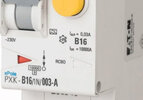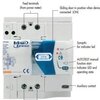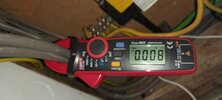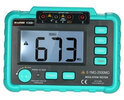Hi, I have a intermittent RCD trip - like weeks between times. Once it trips I can't reset without turning off the MCB then reset it then turn them back on. It never trips again as I switch them on so the 'fault' appears to have immediately resolved. I also have the issue that if we have an external power cut the RCD trips - so power is not restored until I turn off the MCB and reset then turn the MCBs back on. Any suggestions welcome .... Thx

You are using an out of date browser. It may not display this or other websites correctly.
You should upgrade or use an alternative browser.
You should upgrade or use an alternative browser.
RCD problems
- Thread starter heliarch
- Start date
Sponsored Links
It's poorly written but I think he has to turn off ALL the MCBs in order to be able to reset the RCD.
This is the case sometimes but I am not sure why.
As to the problem, I would say it needs someone to test the RCD and the current leakage values.
If they turn out not to be the problem then I think such an infrequent occurrence will be virtually impossible to determine.
It could be something like a floorboard screw penetrating a cable which only causes a trip when stepped on.
This is the case sometimes but I am not sure why.
As to the problem, I would say it needs someone to test the RCD and the current leakage values.
If they turn out not to be the problem then I think such an infrequent occurrence will be virtually impossible to determine.
It could be something like a floorboard screw penetrating a cable which only causes a trip when stepped on.
Sorry yes missed the 's' , once the RCD trips either randomly or if we have a power cut then I have to turn all the MCBs off before the RCD will reset. The RCD will randomly trip even if we are away and not because of a power cut.
Sponsored Links
You need to keep a log of when it trips and what you were using at the time BUT it could simply be accumulated leakage across all the RCD protected circuits
Unlikely to be a diy diagnosis or fix
Unlikely to be a diy diagnosis or fix
Y I did wonder about cumulative leakage - I've added lots of additional small electronic devices but then realised they are all double insulated so no earth to leak to. However they all use Switch Mode PSUs these days so could the initial switch on of them all at the same time cause a transient imbalance between L and N to trigger the MCB?
RCD - It might do with everything else.However they all use Switch Mode PSUs these days so could the initial switch on of them all at the same time cause a transient imbalance between L and N to trigger the MCB?
There really is no point speculating. It needs measuring.
- Joined
- 11 Jan 2004
- Messages
- 43,860
- Reaction score
- 2,868
- Country

I used to have the same issue with the old MEM boards with the "tennis racquet" RCD.This is the case sometimes but I am not sure why.
- Joined
- 27 Jan 2008
- Messages
- 24,903
- Reaction score
- 2,877
- Location
- Llanfair Caereinion, Nr Welshpool
- Country

My old house was the same, I assumed some spikes on the supply, the insulation tester showed no faults, and the RCD passed with tested, but it could go 2 years with no problem, then trip 4 times in 2 weeks.
As a result, with this house fitted all RCBO's, so I did not get a repeat of what happened with the old house.
One should test background leakage, a meter like this
 can be used to test leakage, however when I fitted the RCD's in the old house, there was no option of using RCBO's. So knowing the background leakage did not help, as little one could do anyway. The X-pole
can be used to test leakage, however when I fitted the RCD's in the old house, there was no option of using RCBO's. So knowing the background leakage did not help, as little one could do anyway. The X-pole  has a warning with the red arrow, but one is not going to sit there watching it, so not really much help. There are even auto resetting
has a warning with the red arrow, but one is not going to sit there watching it, so not really much help. There are even auto resetting  but not permitted any longer with domestic, so it is really down to how much one is willing to spend to reduce the problem.
but not permitted any longer with domestic, so it is really down to how much one is willing to spend to reduce the problem.
As a result, with this house fitted all RCBO's, so I did not get a repeat of what happened with the old house.
One should test background leakage, a meter like this
 has a warning with the red arrow, but one is not going to sit there watching it, so not really much help. There are even auto resetting
has a warning with the red arrow, but one is not going to sit there watching it, so not really much help. There are even auto resetting  but not permitted any longer with domestic, so it is really down to how much one is willing to spend to reduce the problem.
but not permitted any longer with domestic, so it is really down to how much one is willing to spend to reduce the problem.Having quite a number of MCBs fed by one RCD can lead to problems in diagnosing Earth Leakage faults, as alluded to by ericmark.
Although it will cost to change them, in the long run replacing those MCBs with RCBOs will make fault finding easier.
(In Australia/NZ, not more than three circuits may be fed by one RCD.)
Although it will cost to change them, in the long run replacing those MCBs with RCBOs will make fault finding easier.
(In Australia/NZ, not more than three circuits may be fed by one RCD.)
- Joined
- 11 Jan 2004
- Messages
- 43,860
- Reaction score
- 2,868
- Country

When did this rule come in?(In Australia/NZ, not more than three circuits may be fed by one RCD.)
- Joined
- 27 Jan 2008
- Messages
- 24,903
- Reaction score
- 2,877
- Location
- Llanfair Caereinion, Nr Welshpool
- Country

It is so easy to measure total earth leakage  getting the jaws around line and neutral into consumer unit is easy, showing my leakage of 8 mA, however to measure each circuit not as simple, as one needs to remove the cover from consumer unit to access line and neutral only.
getting the jaws around line and neutral into consumer unit is easy, showing my leakage of 8 mA, however to measure each circuit not as simple, as one needs to remove the cover from consumer unit to access line and neutral only.
So easier to test insulation resistance, this meter can use 250, 500, or 1000 volts, however DC so can miss problems with capacitance or inductive linking, but on 250 volt range, easy test neutral to earth on appliances to find faults, neutral to earth as the line may have a switch or relay which means with no power only testing to relay or switch.
can use 250, 500, or 1000 volts, however DC so can miss problems with capacitance or inductive linking, but on 250 volt range, easy test neutral to earth on appliances to find faults, neutral to earth as the line may have a switch or relay which means with no power only testing to relay or switch.
Both meters cost me £35 each, so as a homeowner, start point, is unplugging any class I equipment. Class I means it needs an earth, class II does not have an earth, so any item like a phone charger with plastic earth pins is unlikely to cause a problem.
Five times 32 amps and one 16 amps clearly well exceeds 80 amps of the RCD. So I would look at the DNO fuse, it needs to be 80 amps or less, mine is 60 amps so would be OK. The cooker is a problem, turn it off at the isolator, and one loses the clock, same with microwave, so the idea of unplugging is not without problems.
Today, your set-up would not really be an option, one would want items like the garage to be on its own RCD, and having all three socket circuits on the same RCD does seem a little daft. But until 2001 we hardly used RCD's but by 2008 near everything had to be RCD protected, but regulations are not retrospective, and in the early days we could not get the single width compact RCBO's we have today, and we did not realise the problems having so many circuits on one RCD.
A new consumer unit with all RCBO will likely cure your problem, but seems like using a sledgehammer to crack a nut. And I have to admit, never did change it with old house, was on my to-do list, but sold house before it was done, however with this house made sure all RCBO's as did not want same problem as last house.
We have electricians on this forum who claim their RCD's never trip, how much is due to improved RCD's, and how much due to area where there are no spikes, can't tell. My old house the RCD's fitted second hand in around 1992, when my son became a radio ham at round 14-year-old, and I wanted to protect him. Still alive today, so it worked.
 getting the jaws around line and neutral into consumer unit is easy, showing my leakage of 8 mA, however to measure each circuit not as simple, as one needs to remove the cover from consumer unit to access line and neutral only.
getting the jaws around line and neutral into consumer unit is easy, showing my leakage of 8 mA, however to measure each circuit not as simple, as one needs to remove the cover from consumer unit to access line and neutral only.So easier to test insulation resistance, this meter
 can use 250, 500, or 1000 volts, however DC so can miss problems with capacitance or inductive linking, but on 250 volt range, easy test neutral to earth on appliances to find faults, neutral to earth as the line may have a switch or relay which means with no power only testing to relay or switch.
can use 250, 500, or 1000 volts, however DC so can miss problems with capacitance or inductive linking, but on 250 volt range, easy test neutral to earth on appliances to find faults, neutral to earth as the line may have a switch or relay which means with no power only testing to relay or switch.Both meters cost me £35 each, so as a homeowner, start point, is unplugging any class I equipment. Class I means it needs an earth, class II does not have an earth, so any item like a phone charger with plastic earth pins is unlikely to cause a problem.
Five times 32 amps and one 16 amps clearly well exceeds 80 amps of the RCD. So I would look at the DNO fuse, it needs to be 80 amps or less, mine is 60 amps so would be OK. The cooker is a problem, turn it off at the isolator, and one loses the clock, same with microwave, so the idea of unplugging is not without problems.
Today, your set-up would not really be an option, one would want items like the garage to be on its own RCD, and having all three socket circuits on the same RCD does seem a little daft. But until 2001 we hardly used RCD's but by 2008 near everything had to be RCD protected, but regulations are not retrospective, and in the early days we could not get the single width compact RCBO's we have today, and we did not realise the problems having so many circuits on one RCD.
A new consumer unit with all RCBO will likely cure your problem, but seems like using a sledgehammer to crack a nut. And I have to admit, never did change it with old house, was on my to-do list, but sold house before it was done, however with this house made sure all RCBO's as did not want same problem as last house.
We have electricians on this forum who claim their RCD's never trip, how much is due to improved RCD's, and how much due to area where there are no spikes, can't tell. My old house the RCD's fitted second hand in around 1992, when my son became a radio ham at round 14-year-old, and I wanted to protect him. Still alive today, so it worked.
I think, albeit to a small extent, inrush might make some contribution in the all off then all on = trip but other things can accumulate too alongside like NE faults, moisture in wiring all playing a small fraction of a part to trip an almost tripping RCD, hard to nail dawn (or it can be).
Suprisingly, the incomming supply has been known to play a part and I am aware of it being "cured" by the DNO on their part apparently.
Suprisingly, the incomming supply has been known to play a part and I am aware of it being "cured" by the DNO on their part apparently.
Eh, as far as I know the red flag on Eaton RCDs is a mechanical on/off indicator (green when tripped or off). For the Xpole MCBs I‘m certain it is, for the RCDs I‘d have to take a look at the datasheet. I live about 100 miles from the European Eaton HQs, so I see a lot of their products.
- Joined
- 28 Apr 2004
- Messages
- 7,831
- Reaction score
- 738
- Country

DIYnot Local
Staff member
If you need to find a tradesperson to get your job done, please try our local search below, or if you are doing it yourself you can find suppliers local to you.
Select the supplier or trade you require, enter your location to begin your search.
Please select a service and enter a location to continue...
Are you a trade or supplier? You can create your listing free at DIYnot Local
Sponsored Links
